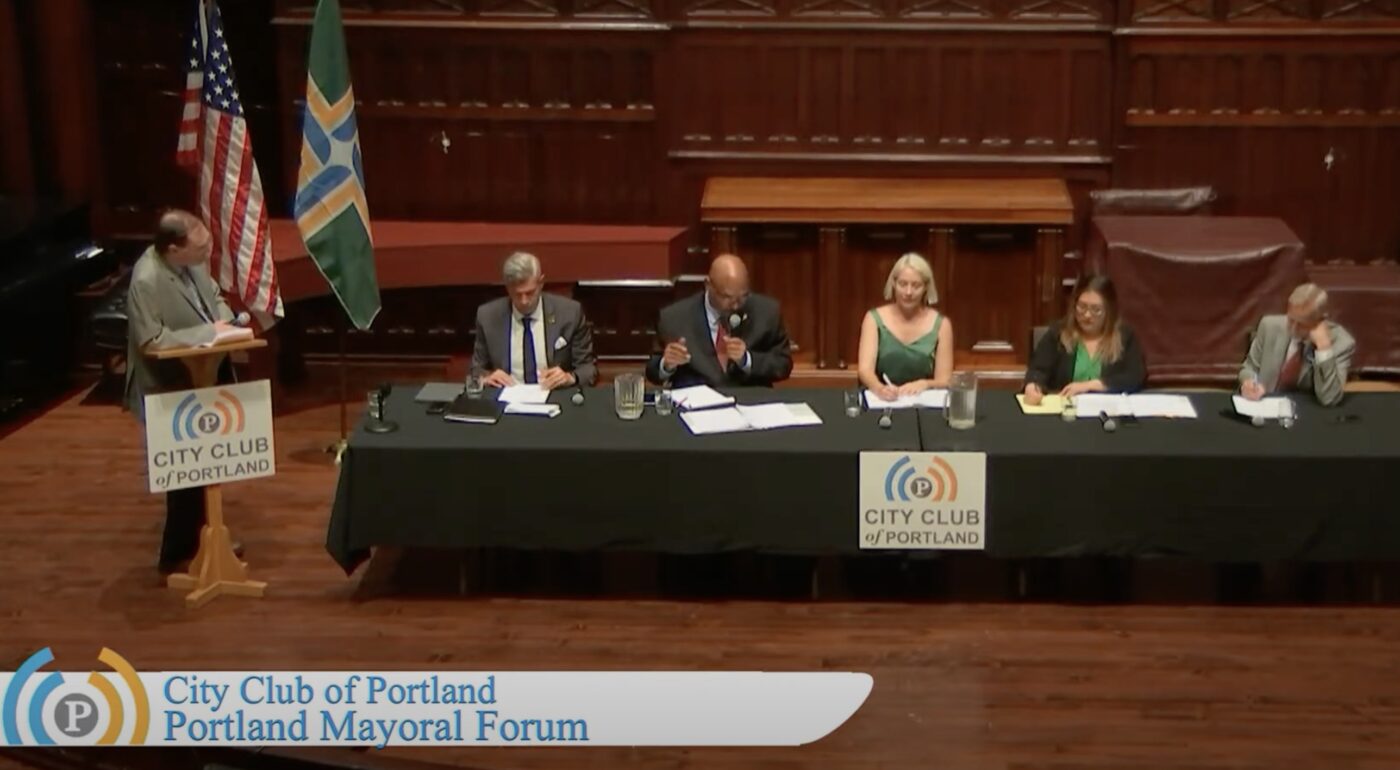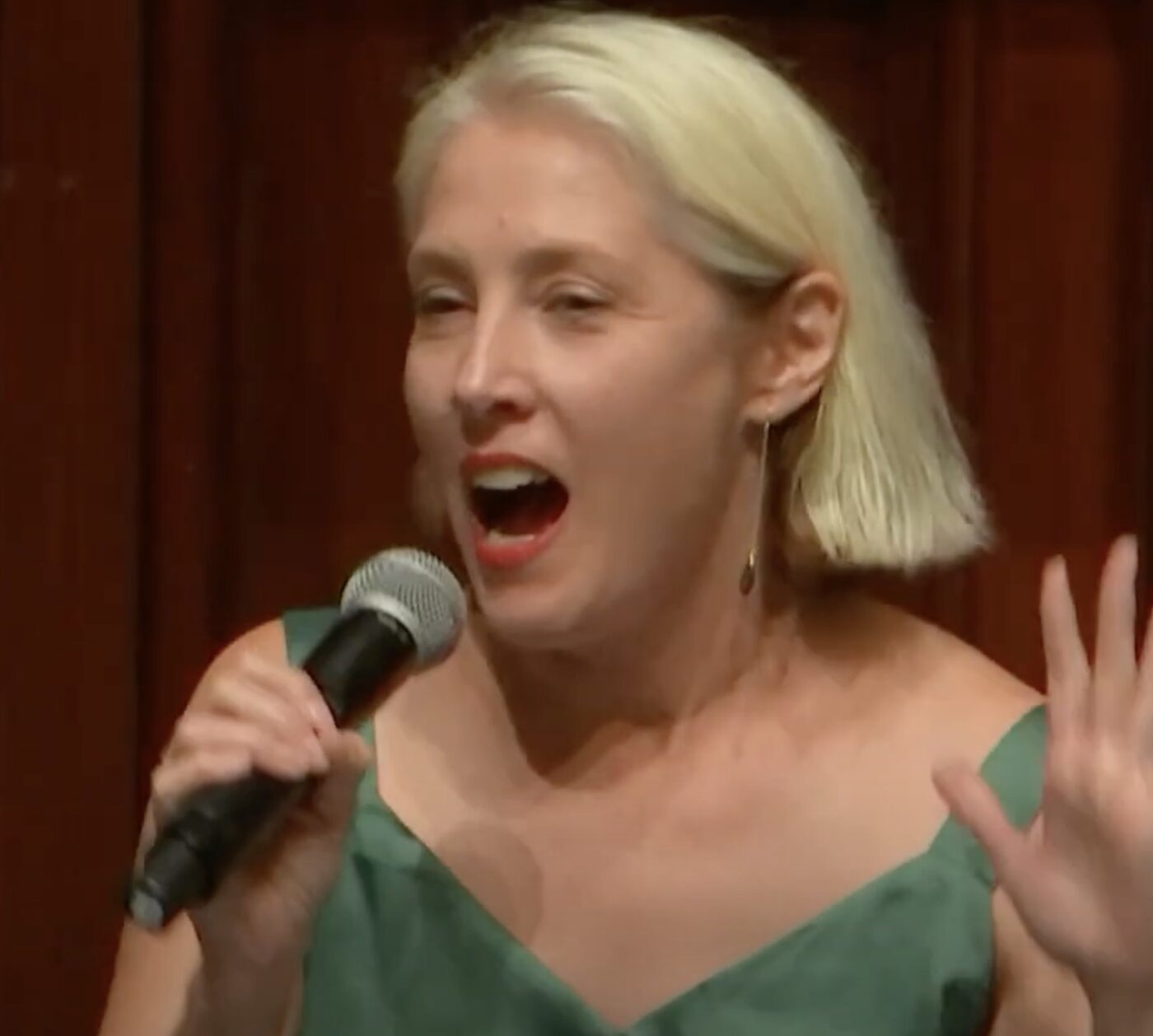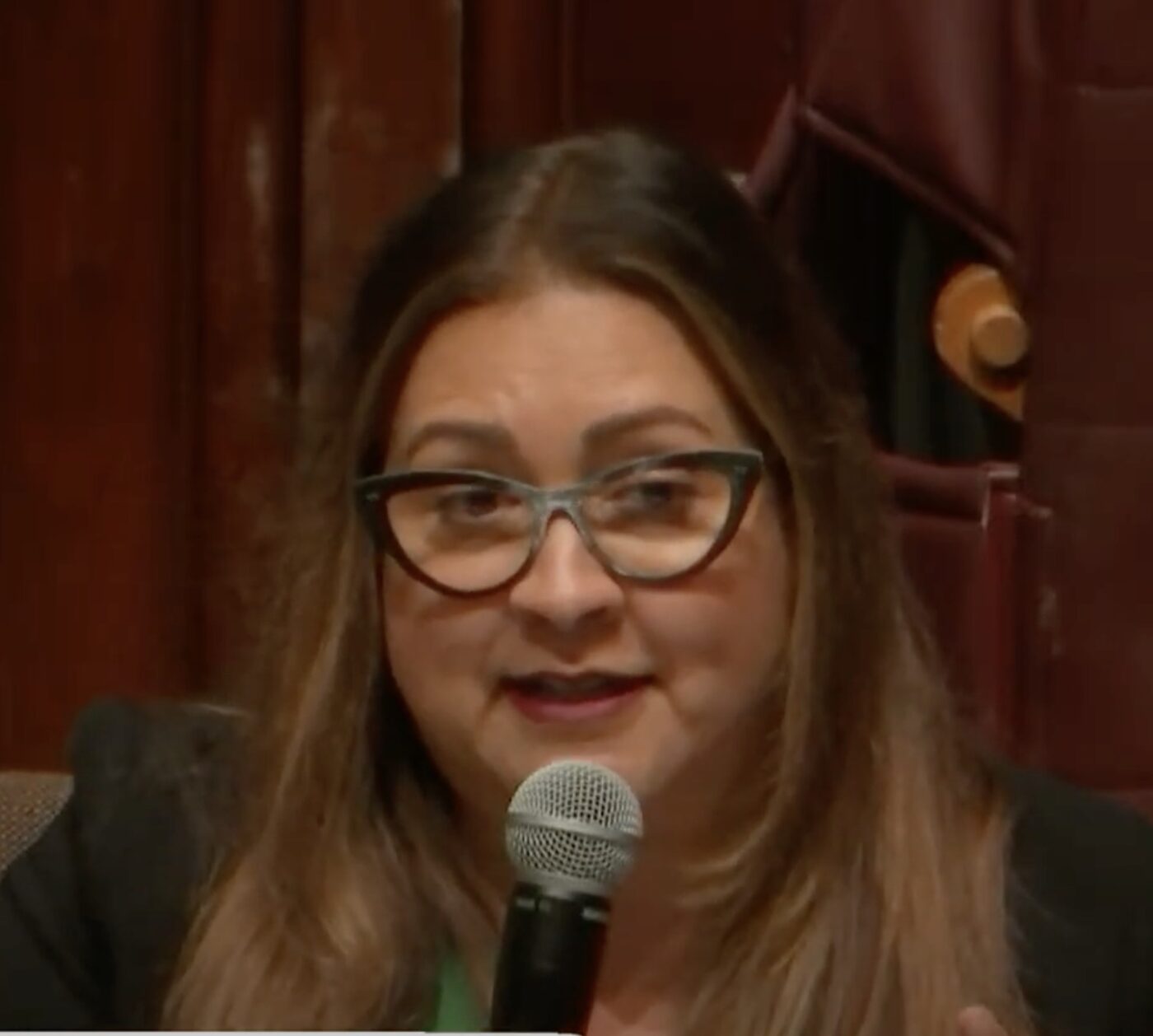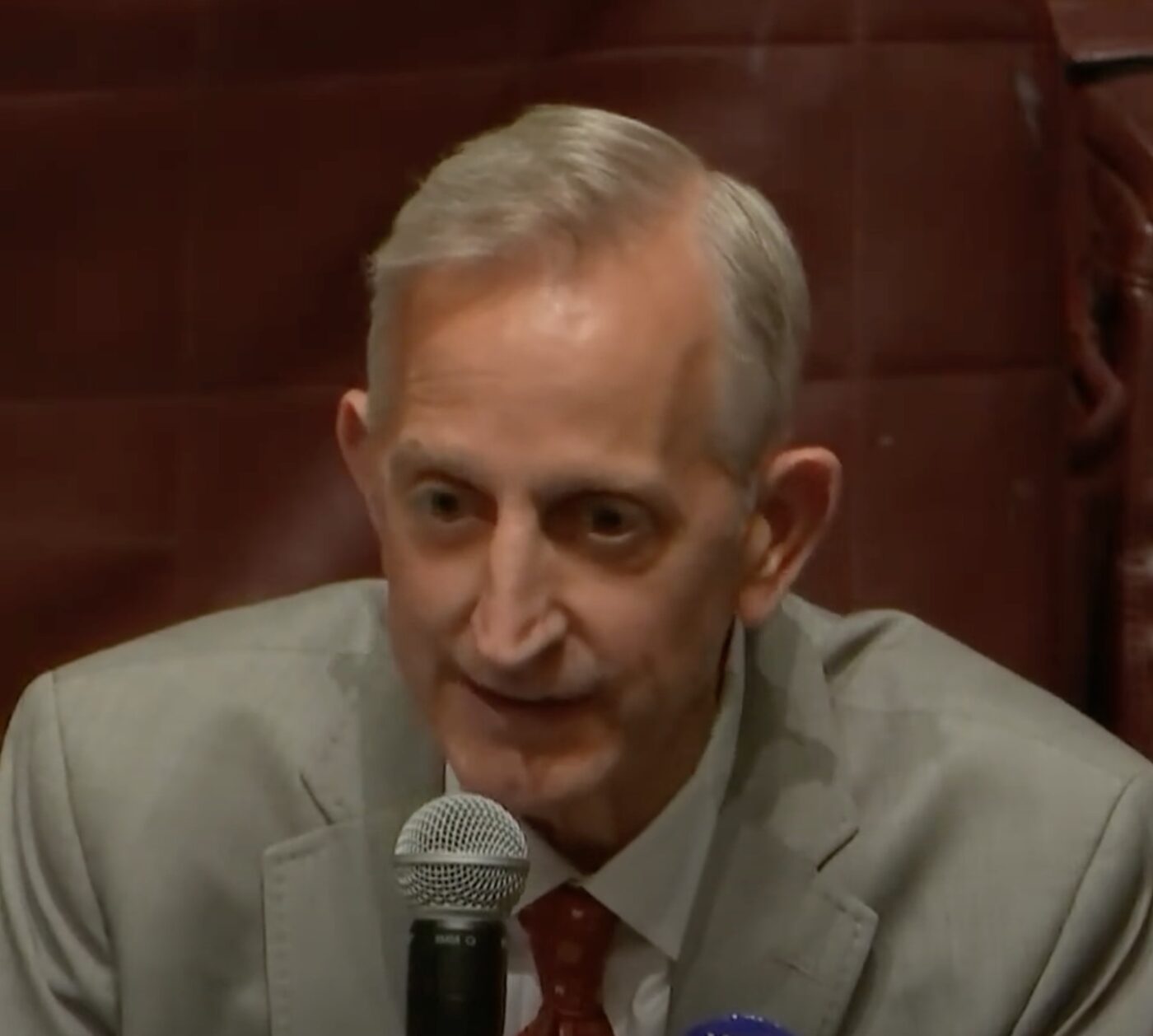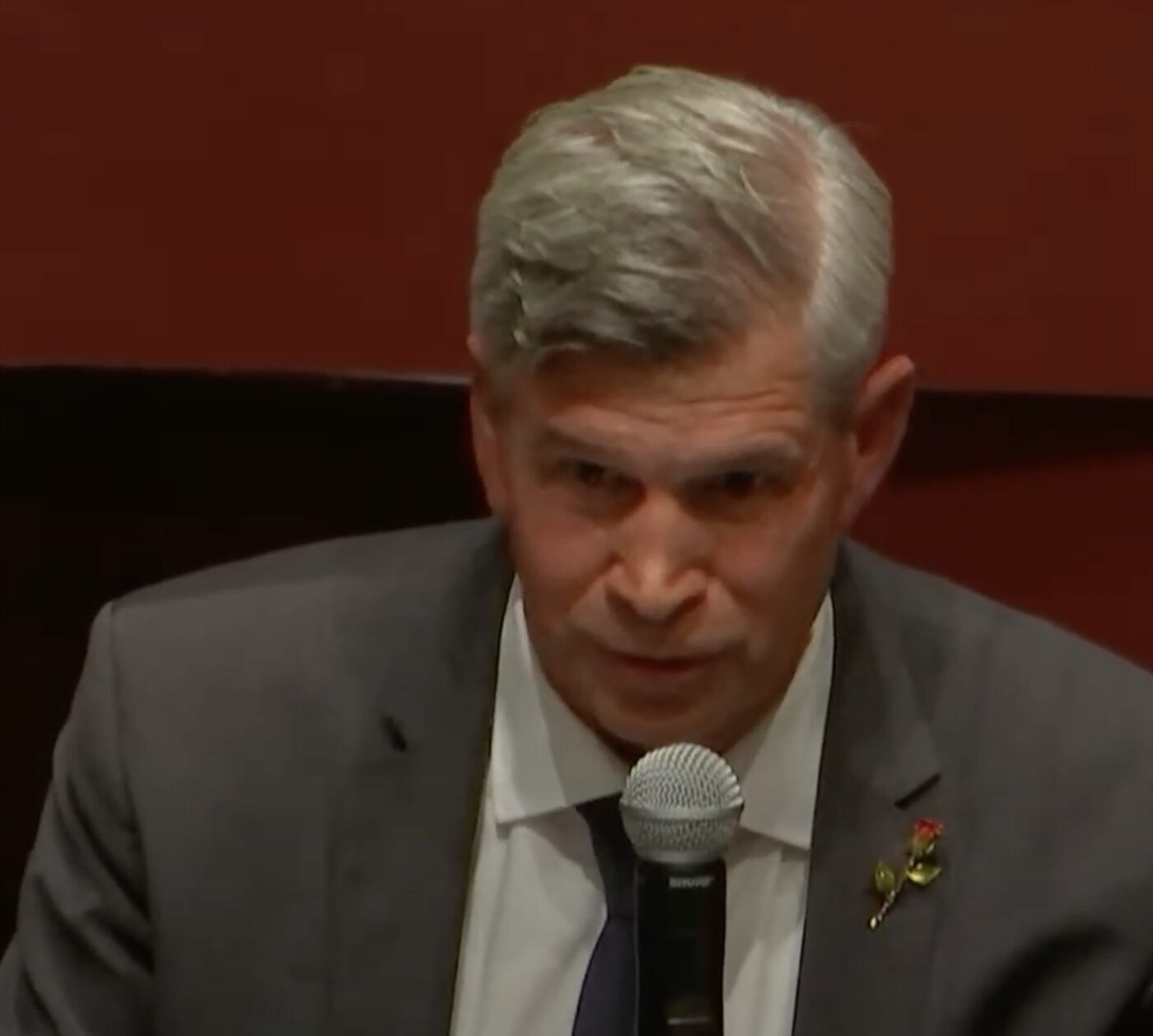Leave it to Jeff Mapes to seize his opportunity as moderator of last night’s mayoral debate to ask the top candidates a transportation question.
Mapes notched over 40 years as a reporter for The Oregonian and Oregon Public Broadcasting and in 2009 wrote Pedaling Revolution, a critically-acclaimed book that chronicled the rise of bicycling in America at a time when Portland was riding very high as a cycling city. I recall hanging out with Jeff at the National Bike Summit in 2007, which he attended as part of his research for the book. Mapes also once labeled Portland’s cycling advocates as a “micro-constituency” and the “bicycling base” of former mayor Sam Adams.
His question to mayoral candidates Liv Osthus, Carmen Rubio, Rene Gonzalez, Mingus Mapps and Keith Wilson came at the very end of last night’s debate hosted by City Club of Portland. And based on the way he asked it, it was clearly a bonus question Mapes had up his sleeve. “We’re not on live TV, so you know what?” Mapes said, “I’m just going to ask one more question.”
We’re lucky he did, because the responses were interesting and relatively meaty given that campaigns have been focused heavily on homelessness and public safety. Below is Mapes’ question and answers from each candidate in the same order as last night (answers edited for clarity), followed by my takeaways.
Mapes
“Traffic congestion is worse than it was before the pandemic, transit is struggling, the road maintenance backlog is humongous, and we’re far from meeting safe street goals. How do you have a positive vision for how we can better move ourselves around the city?”
Mingus Mapps
“As the former commissioner in charge of PBOT [Portland Bureau of Transportation], this is a space I know well. Here a couple things every Oregonian and every Portlander needs to know: The systems that we use to fund our transportation system are fundamentally broken. It’s a sad truth. The funds that we use to fill potholes and to build bike lanes basically come from parking meter revenues and gas taxes. Our parking meter revenues are down because lots of people are working from home one or two days a week, and gas taxes are going down because cars are much more efficient. Frankly, this is one of the questions we’ll be dealing with in the next legislative session, and that’s also why it’s very important that you have a mayor who’s tuned into transportation issues. In the next year we need to work with our state legislature to develop a new system for funding our transportation system. Ultimately, I believe that’s going to be a vehicle miles traveled tax. I don’t think there’s a lot of controversy around that. There’s a lot of work that we need to do between here and there, and we need our state partners in order to implement that, but I think that’s the way forward. The other thing that we really need to continue to focus on is to build a multimodal transportation system so that you can get where you want to go, how you want to get there. As your commissioner in charge of PBOT, those are the values I brought to this work, and when I’m your mayor, those are also the values I’ll bring to leading the city.”
Liv Osthus (who, by the way, I will interview next week)
“So here’s the confluence of all my favorite ideas. I love public transit. I know that TriMet is Metro, but I whenever I travel, I just I have a fetish for public transportation. So I envision our TriMet being the biggest public art project on the West Coast. Let’s partner with our communities to connect them with TriMet. The Frog Ferry, I love that too… but partner with artists to make TriMet so vibrant, make it free. Everyone will ride if it’s free! The public safety aspect, it will be safer if it’s free and everyone rides and it and it’s a very wholesome place. It will be inspiring for our people suffering from addiction, even they’ll be like, ‘Gosh, I want to get sober for that!’ And then PBOT needs help because not as many people are driving, there’s more cycling because not as many people are driving and it’s safer. That’s my vision. So please next mayor, whomever you may be, take it and run.”
Carmen Rubio
“I absolutely agree with Liv, I 100% support free transit. We need to really focus on multimodal transportation, because this is a new way, and climate change is here people, and we need to start acting like it. I also think that we can think about how we increase the greening of our public transit as well. And I think there are multiple new opportunities to figure out how we cross investments in funds like PCEF [Portland Clean Energy Fund], with with transportation and TriMet, and some of those things are discussions that are already happening. So it’s very exciting. And we do need to explore other ways to address revenue challenges and our declining revenue for transportation, so we do need to push and work with the state for the solutions and for those partnerships so that we can continue to do our basic services that we’re required to do as a local jurisdiction, and also make sure that we’re putting safety infrastructure in so that we can maintain our safe streets.”
Keith Wilson
“I’ll tackle it from the congestion standpoint. So congestion has increased 250% since about the mid-90s for all the so we’re spending more and more time in a car. The unfortunate thing is, is that we led the nation just a matter of seven, eight years ago with walking, biking and transit. We’ve lost that. It’s gone down by half. So the TriMet goal for 2030, is for 120 million riders. Today, it’s 60 million riders. That’s their goal, and they have to achieve that, because if they don’t, all of us just are suffering more and more delay and frustrations. So we have to make sure that we have a public safety system and a transit system that are tied together. When we use our transit for a cooling shelter or a warming shelter without providing basic shelter for those, we’re misusing that very important transit system, and then it feels and or is unsafe. On our multi-use paths, when we’re trying to bike to the Gateway parking garage, and we’re going through a humanitarian crisis, and we don’t bike anymore. These are things that I’m hearing from people that used to bike to the transit system to use it in a multimodal situation. We’re forcing families to then drive their kids to school. We’re forcing bus drivers that are uncomfortable or feel unsafe in a job that they should have as a routine and caring for their customers, which is you and me. We need a safer system in Portland. We need to improve livability, and then we need to invest in walking, biking and transit and protected systems so we can move from our cars and move faster to work.”
Rene Gonzalez
“When I chose to start my professional career in Portland, I thought of it as the most European city in 2000. A place where you could walk, where you cycle, where you took public transit. It is, and certainly was, a central part of our identity as a city that we embrace all those various components. I will say, in recent years, at times, that’s also become dogmatic. It was never a ‘war on cars.’ It was walk, cycle and take public transit because it was healthy, because it was social. And so I just want to maybe observe in recent years that it’s become a little bit more brutal. And I would also submit when you’re talking about in east Portland of your single mom with two kids, and you get to a doctor, you’re still going to use your car; and if you’re working in the outer suburbs and you work downtown, you’re likely still going to need to use a car to get to work. So I think we have to acknowledge sometimes the classism in public transit discussion can go too far. I echo Commissioner Mapps’ points on stabilizing funding for transportation our region. This is a really tough nut to crack, and we’re just going to have to partner with various government parties going forward on that. I also want to call out that I think a lot of the congestion in our region is in the suburban areas. We do have some in the city, but we’ve got to get I-5 expansion done. We’ve got to get the Interstate Bridge project done. That is a major congestion point on the West Coast. It’s frankly an embarrassment for us, and we’re not protecting the climate when cars are idling on I-5.”
Thank you Jeff Mapes!
These were the most substantive comments on transportation we’ve heard from leading mayoral candidates to date. Here are some of my takeaways…
Mapps didn’t really answer the question. Instead of sharing his vision, he went into the same spiel about funding he mentions whenever transportation comes up. Yes that’s an important element of the conversation, but I think people want to hear a more decisive answer, some new ideas, and/or something closer to a true vision beyond a milquetoast, “we really need to continue to focus on is to build a multimodal transportation system.” And the fact that Mapps still hasn’t explained why PBOT planned to redesign a downtown bike lane and make it less safe, despite warnings from experts on the agency’s staff, doesn’t give anyone a reason to trust him on this issue.
The answer from Osthus should be turned into a t-shirt and advocacy slogan. I’d certainly buy a sticker that says, “I have a fetish for public transit!” I also noted her enthusiastic tone and it was clear she sees streets with more bike and transit riders as being an important part of Portland regaining its mojo.
Rubio was likely relieved that her problem with parking tickets and license suspensions never came up. Her answer to Mapes’ question was interesting for its full-throated support of free transit. But it made me think: If she believes in free transit, what has she done in her past four years in office to support that? This is the first time I’ve heard her mention that policy. I know she wasn’t in charge of PBOT, but I’m not aware of anything she did to advocate for PBOT transit programs like the Rose Lane Project and I haven’t heard anything about her working with advocacy groups that work of free transit or fight for lower fares such as OPAL’s Bus Riders Unite.
Wilson’s answer had solid scope and clarity. I was glad he didn’t connect the entire answer to ending unsheltered homelessness, the issue that defines his campaign, but that I think he often talks about too much at the expense of other important issues. In his answer, Wilson deftly made the very important connection between the quality of transit and bike path experiences and whether people will choose those modes. He’s been to Bike Happy Hour several times in the past year and his conversations and time spent in our community shone through in his answer. His ending plea to “invest in biking and walking and transit and protected systems” was strong and needed.
The answer shared by Gonzalez was also very clear. His idea that encouragement to walk, bike and take transit more being, “dogmatic” and “a little more brutal” in recent years was very interesting. These choices are a key part of how Portland can solve our transportation problems and they are main elements of our climate and transportation plans, so of course that’s the messaging folks hear from the City of Portland. And by his own admission, Portland has a strong legacy of being “the most European city” and a push to not drive is just baked into this city’s DNA to some degree.
Gonzalez is a regular bike rider and transit user, but he’s also the best politician in the race. By far. He’s a confident speaker, he has a distinct vision, and he knows exactly what his supporters and donors want to hear. That’s why he mentioned expanding freeways (which, by the way, when you create more room to drive and if there’s less idling in the short-term, there will eventually be more cars and more idling in the long-term) and marched out the classic “some people need to drive” strawman. It was also unfortunate that he doubled-down on the same unhelpful class framing that his friend and ally, District 1 City Council candidate Terrence Hayes, likes to make.
Except for Osthus, who likely earned some rankings with her optimism and passion for Portland, I don’t think last night’s debate moved the needle much for any candidate. Gonzalez is still a strong favorite, but I think Wilson is a legit dark horse at this point. Since many Gonzalez and Rubio fans won’t rank either as their second choice (or might not rank them at all), Wilson will likely receive a ton of second-place votes. Add those to his likely large haul of first-place votes and he could surprise everyone.
Stay tuned.

